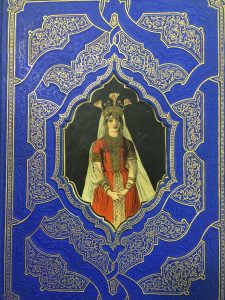Thomas Moore was made an honorary member of the Royal Irish Academy in 1846 and after his death in 1852 his wife donated approximately 1,200 items from his personal library to the Academy. Moore’s Library, which is stored in the Council Room at Academy House, contains eighteenth- and nineteenth-century texts in English, French and Italian. Its contents include works by Shakespeare and Voltaire, titles on oriental and eastern cultures and traditions, and books about Irish history and politics. Moore was an accomplished scholar and thorough researcher as evidenced by the extensive library he acquired. His researching skills and attention to detail are also evidenced by the presence of numerous footnotes throughout the Irish Melodies, National Airs and printed text for Lalla Rookh. Titles on oriental customs and cultures extant in Moore’s Library no doubt provided the poet-songwriter with the knowledge required to write his epic oriental poem. The following quotation, which provides a definition for the word Lalla, is taken from Bibliothèque orientale: où dictionnaire universel, contenant tout ce qui fait connoître les peuples de l’Orient by Barthélemy d’Herbelot (page 143).
“Laleh Ce mot, dont les Persans & les Turcs se servant pour signifier une tulipe, est chez eux le symbole d’un Amant passioné, à cause que cette fleur a ordinairement se feuilles rouges, & qu’elle est marquée au fonds d’une noirceur, qui a quelque ressemblance à la marque que laisse l’application ou l’impression d’un bouton de feu. Ainsi, disent-ils, l’Amant à le feu sur le visage, & la blessure dans le coeur. Laleh Deschti & Lalech Gouhi. Tulipe de campagne & de montagne, c’est-á-dire, sauvage & non cultivée. Les Persans appellent ainsi les anémones, que les Arabes nomment Schacaik al Noôman, à cause que ce fut Noôman, Roi d’Arabie, qui les transporta le premier de la campagne dans ses jardins.”
Image Courtesy of Special Collections, McClay Library, Queen’s University Belfast


